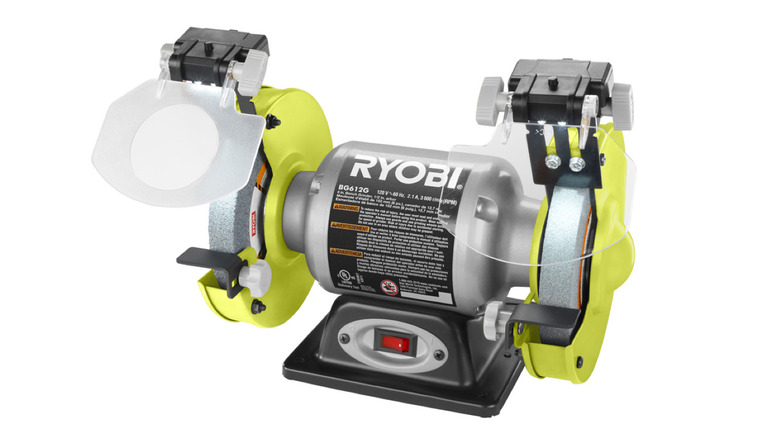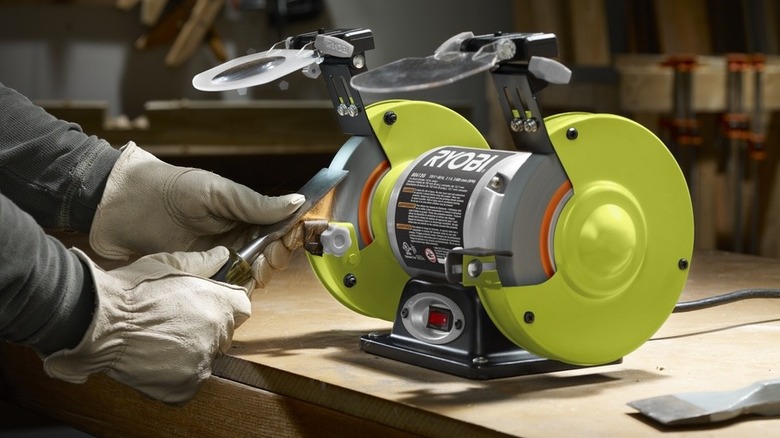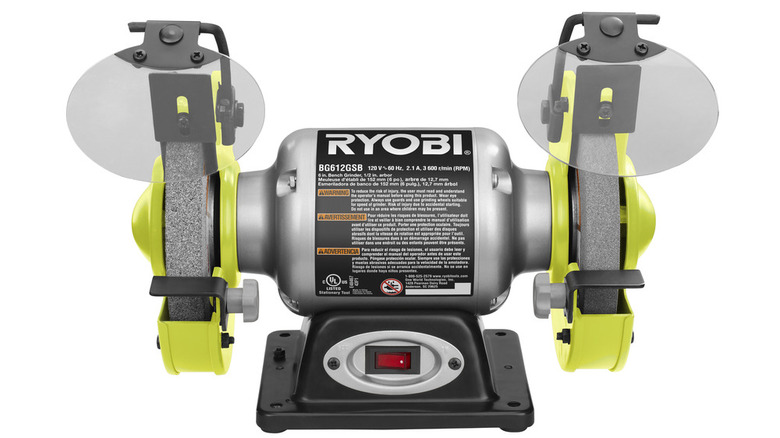Everything You Need To Know About Ryobi's Bench Grinder Before You Buy
Having a wide variety of tools in your toolbox, toolshed, or garage can be an excellent investment because not only is it useful for general household maintenance, but you never know what mishap or emergency might occur when you need a specific tool at a moment's notice. Just as important as having the tools in your arsenal is maintaining them. This doesn't just mean having proper storage and organization for your tools — though that is an important piece that can't be ignored — it also means ensuring that your tools are in top working condition when you need them. One of the ways you can do this is by investing in a power grinder, such as a bench grinder, which makes it easy to sharpen or polish smaller tools like drill bits and chisels to make sure that they remain in the best shape they can be, as any tool will endure wear and tear over time.
If you are already in the Ryobi ecosystem or want to start investing in Ryobi tools, the company has a 6-inch Bench Grinder available that will surely address all of your tool maintenance needs. Let's break down exactly what goes into this Ryobi tool.
The Ryobi Bench Grinder is less powerful compared to other bench grinders
The 6-inch Ryobi Bench Grinder comes with a number of features that most anyone would want to have. The tool's heavy gauge steel base is the most basic of those features. When the 36-grit and 60-grit wheels on Ryobi's Bench Grinder start spinning, the 2.1-amp induction motor could cause it to jostle quite a lot, which would be rather disadvantageous when trying to sharpen or polish something as small and precise as a drill bit. This steel base keeps that shaking to a minimum, allowing you to put the grinder on any tool bench without worry.
One reason it is able to achieve that stability is that the 2.1-amp motor is on the lower side of the spectrum when it comes to power. When converted to horsepower, this comes out to about ⅓ hp. Meanwhile, the JBG-6A 6-inch bench grinder from Jet operates at ½ hp, and the 6-inch bench grinder from DeWalt — the best-selling tool brand in the United States — operates even higher at ⅝ hp. These may seem like minor differences in the fractions of horsepower, but when it comes to grinding elements that are so small that they require careful precision, those fractions can make quite a bit of difference. The 2.1-amp motor may be enough for your needs, but if you require a more powerful grinder, it might be better to look elsewhere.
Unique features of the Ryobi Bench Grinder
While power is important, it is not the only reason to choose a particular bench grinder. The Ryobi, in particular, offers a good deal of features that make it a desirable choice. One of the more interesting features is that it incorporates LED lights to help you see the details of what you are grinding, along with a magnifying lens incorporated into one of the two adjustable spark shields. One curious bit about the LED lights is that they are not powered by the power cable that operates the grinder. Instead, they use four AAA batteries. In the customer reviews for the bench grinder on Ryobi's website — over 95% of which are four stars or higher — this comes up as a frequent complaint, even if everything else about the tool works perfectly.
It also has elements that are pretty standard for bench grinders, like adjustable tool rests and the aforementioned spark shields. Ryobi sells its bench grinder at a relatively affordable price, retailing for just $79. Meanwhile, DeWalt sells its 6-inch bench grinder for $111.21, and the Jet bench grinder retails for a whopping $265. While these are more powerful models, neither one features LED lights or a magnifying lens. So, not only does the Ryobi 6-inch Bench Grinder cost less, but it offers more features in terms of convenience. You just need to make the call on whether the appeal of the price and features outweighs its slight power deficiencies.


